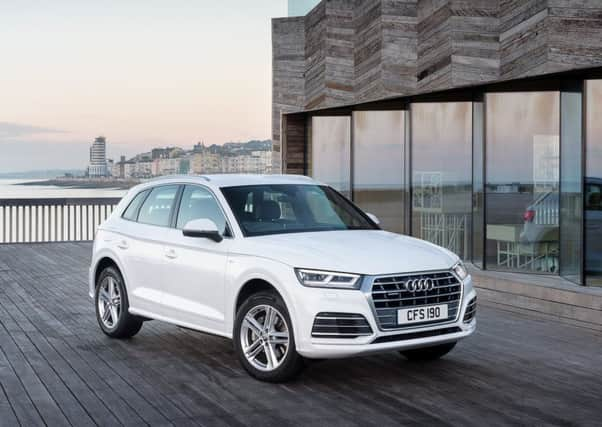Review: Audi Q5


Diesel engines emit more noxious, unhealthy gases than petrol cars. The industry claims that the latest models have technology which keeps them as clean as petrol power – plus the reduction in carbon dioxide (CO2) because they give more miles a gallon. This CO2 rating has been the sole arbiter of road tax in the UK.
Older petrol and even quite new diesel vehicles are now facing high charges to drive in London. The question buyers face is whether to choose a petrol or an electric model when purchasing a new car. Buying an older diesel car looks risky for city drivers. Prices will drop as the cars become outcasts.
Advertisement
Hide AdAdvertisement
Hide AdA survey suggests that three in five diesel car owners will switch to petrol, hybrid or electric power when they change cars. “The Volkswagen ‘dieselgate’ scandal appears to be having a lingering impact on trust, with 30 per cent saying that mistrust of official testing figures has played a part in their decision to switch,” noted buyacar.co.uk, which surveyed 1,000 drivers.
Owners of most diesel cars built before September 2015 and pre-2006 petrol cars are likely to be targeted under the government proposals. From October all cars, motorcycles, vans, minibuses, buses, coaches and heavy goods vehicles will need to meet exhaust emission standards or pay a daily charge when travelling in central London, on top of the standard congestion charge of £11.50. Expect other large cities to introduce charges.
Most commercial vehicles use diesel fuel. Most prestige cars offer petrol engines but buyers choose diesel because of the economy gains. Almost all SUV and 4x4 and many crossover cars are bought with diesel engines for the same reason. Advances in technology mean that CO2 figures are much lower than ten years ago. This week’s test car, the Audi Q5, is offered with petrol or diesel engines. Mine was the 187bhp 2-litre turbo diesel with automatic gears and 4x4 traction. It is rated at 132g and around 55mpg (subject to wheel size), with a 0-62mph time of 7.9 seconds, from £38,340. The 249bhp 2-litre petrol version is rated at 157g, around 40mpg, 0-62 in 6.3 and costs £39,405. The fast or affluent or plainly show-off and un-green set can have the higher-polluting 3-litre V6 petrol giving 349bhp, 0-62 in 5.4 seconds, from 189g and 34mpg. Price £51,200.
The Q5 sits in the middle of Audi’s popular Q series of sporty 4x4s. It has a size which is just about right: roomy but not so large that it’s a blighter to park. They seat five. They look good, assured, a Germanic alternative to the Defender Sport. You should also be looking at the Jaguar F-Pace, BMW X3 and Mercedes GLC. I’ll deftly dodge the “which one?” question for the moment.
This year’s new Q5 is slightly larger but up to 90kg lighter. This is good news for economy and performance. Aerodynamics are improved, reducing wind noise in a body which only looks new when you see the outgoing model. The face now pouts out from the bonnet and there is more shaping and a starker shoulder crease along the sides.
So, where is it built? Germany? No. Ah, Spain where SEAT builds the Audi Q3? No. It comes from a factory in Mexico, which does not fill me with joy and is a long and CO2-heavy shipping route back to Europe. Not too far for the pick of the world motoring press to go for a first drive. I digress.
The Q5 has been honed since its arrival in 2008 to become Audi’s best-selling car. It is noticeably quieter on the move. Audi reckons it is the quietest car in its class.
This class could include two other cars from Volkswagen’s empire, the SEAT Ateca and the VW Tiguan. They are shorter and cheaper. For size, check the VW Touran mpv. For something larger, the new Skoda Kodiaq is a stormer, with a seven-seat option and some £4,000 less than an equivalent Q5.
Advertisement
Hide AdAdvertisement
Hide AdSetting off in the Q5 can be worrying, with a very soft engine uptake which caused a heart flutter when exiting a junction. This pause is eliminated if you select Dynamic mode. The driving modes include off-road, which moderates the responses in the rough.
The interior is dark and smart – the back seats slide by several inches to adjust legroom with luggage space. So too is the adaptable “virtual” cockpit. My demo car had the fixed screen. There’s a fist-sized shift lever for the standard seven-speed automatic gearbox on a broad transmission housing. It is all very nice.
The diesel demo car had optional 19-inch alloys which gave a decent ride quality but the standard 18s are regarded as more cosseting. The 19s cost £900 – the price of adulation in the car park at the Camshaft Arms.
Handling is on the OK side of average. The Q5 doesn’t feel like a natural at fast cornering and I found it hard to match a deftly driven Skoda Mii through a series of roundabouts.
Verdict: Refined revision of the Audi classic.